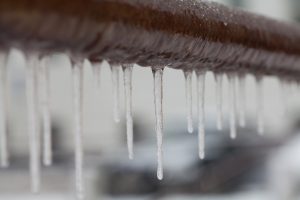 If you’ve lived in the Holladay area through even just one winter, then you know we’re notorious for our cool and dry temperatures during the winter. You also, of course, know that colder weather comes with snow, and ice!
If you’ve lived in the Holladay area through even just one winter, then you know we’re notorious for our cool and dry temperatures during the winter. You also, of course, know that colder weather comes with snow, and ice!
The development of ice means you need to move fast to protect and prepare your home before winter arrives in earnest. Do you have drafty doors allowing warm air to escape from your living space? Is your indoor air quality in good shape, or could you use a whole-house humidifier this season? Last but certainly not least, is your plumbing system prepared for the season? Just a couple of consecutive days of below 30°F temperatures can result in frozen pipes, which create a huge problem. We’re going to discuss below how you can prevent this, but first, why is it such an issue?
The Problem with Frozen Pipes
You may think you don’t really need to know why frozen pipes are a problem—they prevent you from using the affected area of plumbing, right? Well, yes, but it’s more than that—the actual frozen pipe itself isn’t the biggest threat to your home. The danger of frozen pipes actually comes from the thawing process.
As the ice within pipes thaws out, it causes pressure to build up in the pipes, which can and will cause pipe ruptures, also known as burst pipes. We do not recommend homeowners ever try to thaw out their frozen plumbing on their own. This could leave you with broken pipes, significant water damage, and potentially even injury to yourself.
Preventing Frozen Pipes
The good news is, there are some steps you can follow to prevent your pipes from every freezing to begin with. Once the weather reaches a point you won’t be needing or using your outdoor plumbing, be sure to take the following steps:
Drain the Outdoor Faucets on your Property, Leave Them Open: Your outdoor faucets are, understandably, the ones most prone to freezing. If you have any outdoor faucets that you use for your sprinkler system or hoses, ensure you’ve turned off the water flow to these points, and leave them open.
Disconnect Hoses: Similar to your outdoor faucets, these are prone to freezing, which you don’t want backing up into the faucets and pipes the hoses are attached to. Drain the hoses, and store them indoors if possible—or at least in a shed or garage where they’ll be able to stay dry.
Insulate Pipes: This is something that doesn’t take much time or money and can be done by you, the homeowner. Simply purchase some insulating sleeves, or even towels, to put around your pipes that are susceptible to freezing. This can include your exposed pipes in your basement, underneath your kitchen and bathroom sinks, and anywhere else that a pipe leads outdoors—perhaps your washing machine.
Keep Your Cabinets Open: We’re talking about any cabinets that have plumbing within them—specifically, the exposed P-traps beneath your kitchen and bathroom sinks. Leaving the cabinets open enables the heat from your heating system to reach these areas, making it less likely for your pipes to have problems with the cold. This is especially pertinent if these rooms have walls that face the outdoors, and pipes behind those walls.
When you need a professional Holladay, UT plumber, look no further than our team! Contact us today and see what keeps our customers saying “I Love My Design Comfort.”


